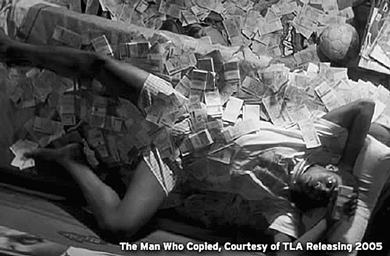Jorge Furtado tells simple love story rich in detail and satisfying in its twists
The magical Brazilian film “The Man Who Copied” chronicles the enchanting romance that develops between André (Lázaro Ramas, of “Madame Satã”), a photocopy operator, and a young shopgirl named Silvia (Leandra Leal). Bouyed by a visually inventive narrative—by writer/director Jorge Furtado, who deftly mixes animation with André’s voice over—this film is an endearing character study.
A poor, young man in Porto Alegre, André works in a store making Xeroxes. He learns about life by reading portions of what he copies—whether a Shakespearean sonnet or facts about Eleanor Roosevelt. At home, he mostly draws (Roosevelt becomes a figure in his comic artwork), but he also watches his neighbors with a pair of binoculars, studying their habits and behavior. He is particularly smitten with Silvia, who lives in a building visible from his bedroom window, but she does not know that he exists. When he witnesses something disturbing involving her father, André decides to meet Silvia and rescue her from her presumably unhappy life.
When André approaches Silvia in the store where she works, he commits to buying a chenille robe he cannot afford, which requires him to devise a plan to get the money he needs to win the girl of his dreams.
André’s scheme takes shape halfway through the film, when the store he works for gets a color Xerox machine, and he concocts a plan to counterfeit money. This crime sets in motion a chain of events that alter the course of André’s life, but much of the film’s charm is in the subtle ways expectations about the characters and their actions are subverted.
Although Furtado’s plot is pretty simple, “The Man Who Copied” sustains the storyline for two hours because of the richness of the details provided. As narrator, André describes the minutia of photocopying and the routine of his life, but it is captivating because of the way his words are complemented by the imaginative images. The narrative repeatedly hits high points whenever the live action is transformed into animation.
The people in André’s life—including his sexpot co-worker Marinês (Lusana Piovani) who wears tight jeans and no underwear, and her boyfriend Cardoso (Pedro Cardoso) who, like André is a schemer—are engaging. André’s easygoing friendship with Cardoso, who eventually becomes his partner in crime, is entertaining, and the way the two men and Marinês play off one another is quite winning. The slow courtship between André and Silvia is sweet, without being overly sentimental.
The relationships among André, Cardoso and Marinês are important in the film’s final third when their plan to “save Silvia” swings into motion. Because viewers know the characters well by this point in the film, they will root that the trio of schemers succeed in their plans for happiness.
The rich development of the characters defers the growth of the film’s dramatic tension, but the last act of “The Man Who Copied” is truly exciting as coincidences mount up, connections are made and reversals are reveled. Furtado withholds some information to surprise viewers, and he provides other details that are truly satisfying.
The expertise of Furtado’s storytelling is matched by excellent performances. As he showed in “Madama Satã,” Ramos is a remarkable and incredibly resourceful actor. His work here—his excellent voice-over combined with his superb body language and facial expressions—confirm he is a talent of the first order. His male co-star Cardoso is also especially good, and both Leal and Piovani as their respective love interests project soul and spirit that, like the film, are totally captivating.
gaycitynews.com


































